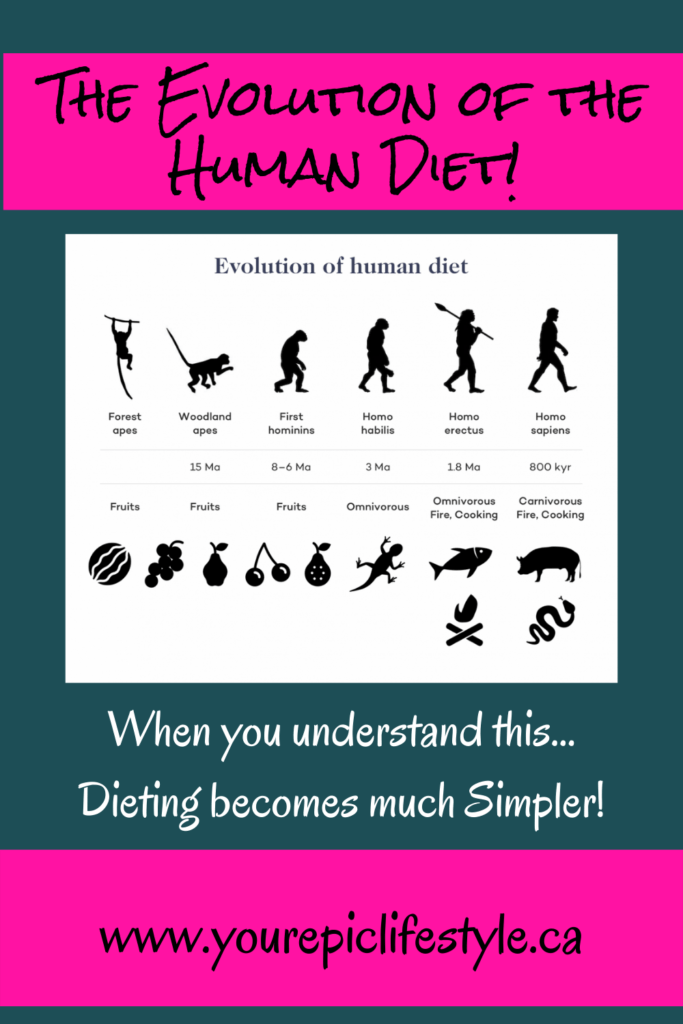The Most ESSENTIAL Healthy Diet Lesson You Need To Know…
That no one is really talking about
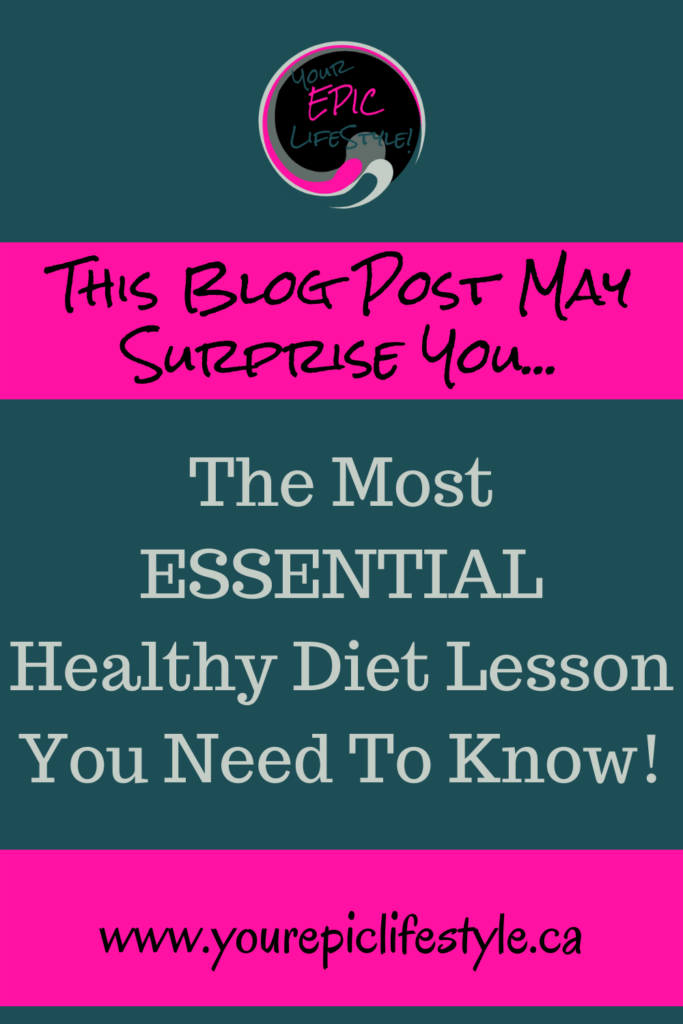
If you are looking to eat healthy long term this is the number one way to truly eat a Healthy Diet for a Lean Body and Prevention of Disease.
This blog post may be a surprise for some people…
Because the majority of people don’t look at nutrition the way I am going to explain below.
Rather, people get completely frustrated and confused about nutrition and diet foods, healthy label claims, low-carb vs high carb, raw foods, calories, protein, fat, low-fat, vegetarian, low-cholesterol, etc, etc.
However, if you understand nutrition in the way I have learned to understand it and have tested it for myself, it will solve every frustration or confusion you have ever had about nutrition.
The Evolution Of The Human Diet
Let me warn you right now, this is real “BIG PICTURE” thinking, and it will explain a lot about the body you live in every day if you consider things this way.
Ok, the #1 MOST valuable perspective about nutrition involves the study of Archaeology and anthropology!
OK, OK before you click away let me explain…
So, all that we have learned about the human body and what is either healthy or bad for us today, all started from hundreds of thousands, or even millions of years of evolving as the human body adapted to the environment around us, including food, exercise, nature vs city, and many more.
We have learned from archaeological reports that the current human species (homo sapiens) began approximately 200,000 years ago and our close cousins, such as homo erectus, dating back as far as several million years.
If you research the evidence of what our ancestors used to eat, it shows obvious clues as to how the human digestive system has evolved and what are the healthiest foods we can eat in today’s society.
This explains why in the last 60-70 years with the new chemicals and food types created that humans were never meant to consume cause so many health problems throughout our bodies.
Chemicals such as artificial sweeteners, HFCS (high fructose corn syrup) and other corn derivatives, refined grain products and white bread, refined oils like soybean and unhealthy canola oils, and the list goes on.
The Diet Controversy Will Never Stop Yet History Will Never Change
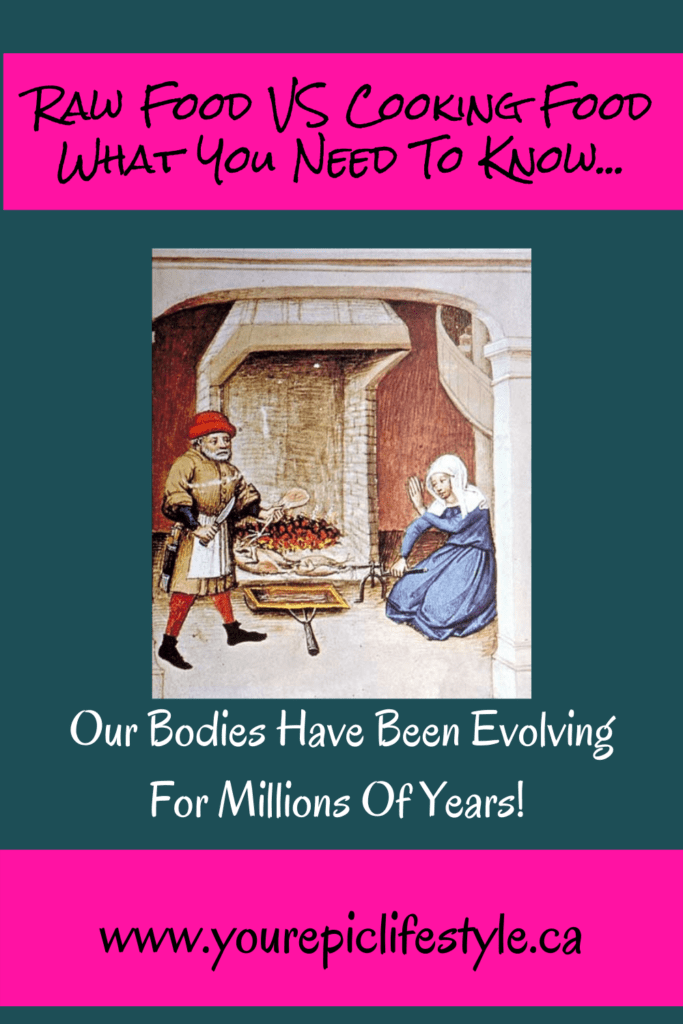
Now this conversation could get very in-depth and I could write an entire book on this subject, but let me summarize the important ideas I want you to think about:
1. Despite what you’ll hear from believers in the “extreme” kinds of diets that remove complete portions of the historical human diet, our digestive systems have evolved to consume a mixture of plants and animal meat (yes we evolved as omnivores) as well as cooked food and raw food.
Believe me, I know there are fiery debates around both meat-eating vs veganism, and raw food. But, it’s historical FACT that our modern human species and historical ancestors (back over a million years ago) in just about every culture around the globe, consumed at least some percent of plant and animal food combination as well as raw food and cooked food combination depending on the seasons.
Different cultures, like the Inuit in the arctic and many tribes in Africa, flourished in health on almost a completely plant-based diet, while other cultures around the world flourished on almost an entirely animal-based diet.
But all cultures commonly had some blend of plant and animal foods, even if the quantity of animal food was less within some cultures, or the quantity of plant food was less in other cultures.
With that said, essentially every culture around the world has historically eaten BOTH cooked foods and raw foods in different amounts, but there is no evidence of cultures thriving on 100% raw food diets.
Yes, there is the argument that raw foodists make that all animals in nature eat 100% raw foods, yet humans are the only species that consume cooked food…
Here is a simple explanation about that… of all the species in the world humans are the only ones whose brain is developed enough to learn how to control fire and consequently learned how to cook our food.
Since we’ve been cooking some of our foods for the whole existence of our species (200,000 years as well as our ancestors back several million years), our digestive systems have evolved and adapted to consuming a part of our foods cooked.
This also explains why acrylamides (Acrylamide is a chemical that can form in some foods during high-temperature cooking processes, such as bbq, frying, roasting, and baking) are more damaging to animals than humans that consume cooked food.
Humans have adapted some tolerance to acrylamides from eating a partially cooked diet for 100’s of thousands of years, but historically animals never ate cooked foods so they are more sensitive to acrylamides.
In case you are not sure what ACRYLAMIDES is, let me quickly explain… they are produced when the outside of foods are burned during cooking, like barbecuing, deep frying foods, charring vegetables over a fire, the browning on loaves of bread and other baked goods. The compounds that are produced are potentially carcinogenic to both humans and animals. Cooking foods with water, and also By using high antioxidant spices and herbs during cooking, as well as boiling foods in water helps reduce acrylamides and guard you against them.
Here is the bottom line… through evolution we have adapted as a species to eat a mixture of both plants and animals as well as cooked and raw foods…
But let me clarify a significant point below…
The Food Source We Were Never Meant To Eat

2. Although I say through evolution we were meant to eat an omnivore diet of both plants and animals, one type of food we were NEVER meant to eat, yet most western diet consists of, is factory-farm raised animals, including eggs and milk from factory-farm raised animals.
Factory farming is a totally new phenomenon that is only decades old, so naturally, mother nature never intended us to eat these types of meat products. Will we adapt over time to consume these foods, I don’t believe so, but time will tell.
Chemically and nutritionally, how factory-farmed animals live and eat is very much different from animals that are raised the way nature intended. These differences are seen dramatically in the nutritional profiles of grain-fed meat vs grass-fed meat, free-range eggs vs factory eggs, wild fish vs farmed fish and again the list goes on and on.
What we are talking about is major differences in omega-3’s and omega-6’s, vitamin and mineral profiles, differences in other healthy fats such as CLA, and a whole lot more.
So while I don’t entirely agree with veganism at least from a nutritional standpoint (moral arguments aside), I also don’t agree with the horrendous conditions these animals live in or the poor quality of food they are fed in western society.
We do our best not to support the factory farm industry as much as possible, which unfortunately is most meats and dairy in your local supermarket and instead, we buy free-range eggs and grass-fed meat from local farmers. The difference in taste alone will blow your mind.
Another Food Source We Were Never Meant To Eat
3. Now I have pointed out that historically many cultures around the world flourished on vastly different percentages of animal and plant products in their diet, this is another type of food that we were NEVER meant to consume:
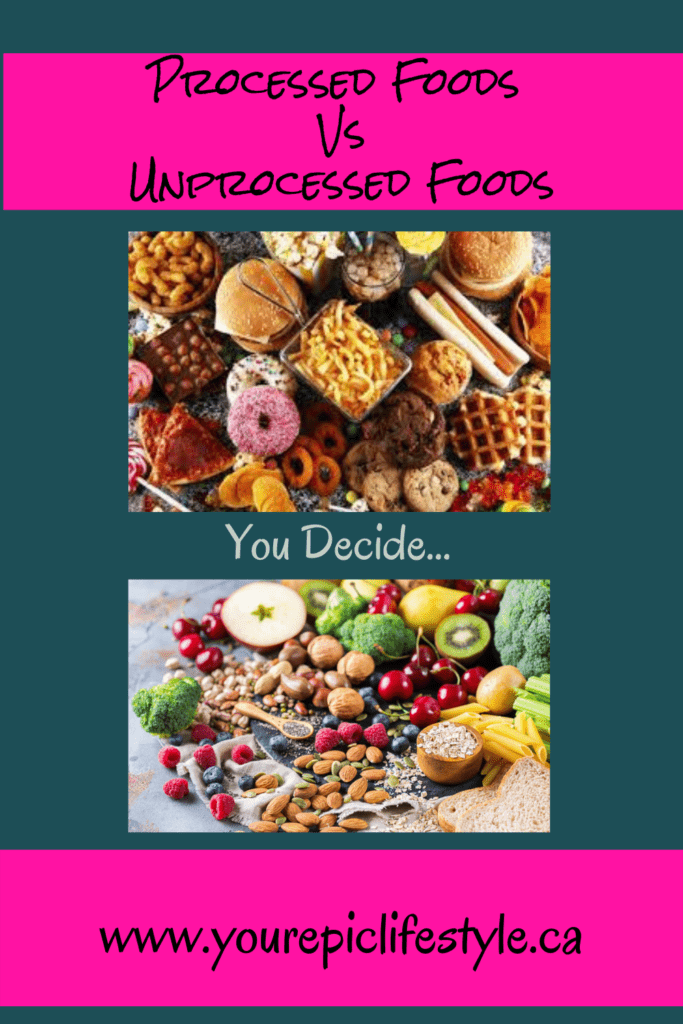
PROCESSED FOOD
Yes, I know this might sting a bit to hear it, but cakes, cookies, crackers, chips, sodas, granola bars, sugary sports drinks and energy drinks, and the 1000’s of other products on every supermarket shelf were never intended to be part of the human diet, so really it’s obvious why so many health problems we are plagued with are a result of eating these types of foods.
This is why I talk about including as many “one ingredient” foods as you can in your diet if you want to eat like we were meant to eat.
“one-ingredient” foods are healthy meats, eggs, nuts, seeds, beans, tubers, fruits, and veggies. It’s really that simple.
How Agriculture Has Changed Our Healthy Diet
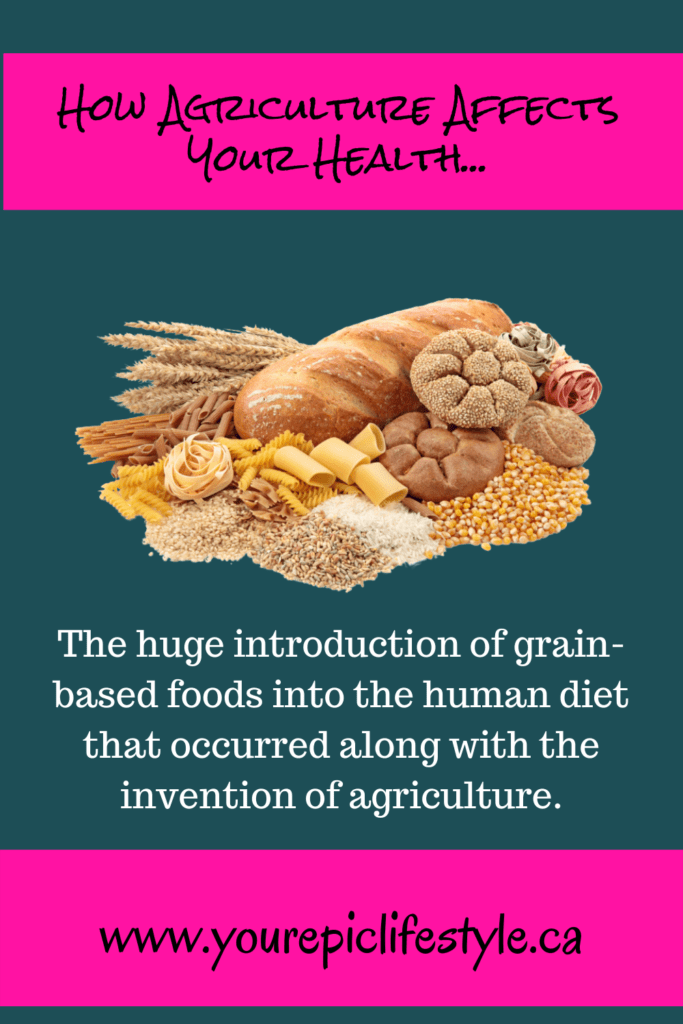
4. Ok, now I’m going to get a little more controversial… but, keep in mind that agriculture is also a relatively new phenomenon in the evolution of the human diet when you go back in history a couple of million years. Let me be clear, when I’m talking about agriculture, I’m essentially talking about the huge introduction of grain-based foods into the human diet that occurred along with the invention of agriculture.
The mass creation of grains through agriculture is really only a few thousand years old. Compare that to our ancestor’s existence as hunter-gatherers dating back a couple of million years, and our current species of homo sapiens’s 200,000-year history as hunter-gatherers.
When you think about it, as hunter-gatherers, we would not have had the access to the grains we have today and the ones we did have access to would have equalled a very small % of our historical calorie intake since they weren’t mass-produced and processed.
Instead, we flourished on mainly game meats (including the organ meats, where most of the micro-nutrients are found), wild fish and seafood, eggs, nuts, seeds, beans, tubers, fruits, and veggies.
With this perspective, grains presumably never accounted for more than 1-3% of our historical calorie intake. From an article, I just read it has been determined that the average person (eating a western diet) is getting 67% of their total calorie intake from grains like soy, corn, and wheat and their derivatives.
I don’t know about you, but to me, that is a shocking revelation that explains why our entire food supply is backwards, and why it has such a large effect on our health.
It also shows you how ridiculously wrong our “food pyramid ” really is, which promotes the bulk of our food to be eaten from grains.
I could go on with more examples, but I think you’re getting the major ideas here.
To me, the most important perspective to eating a healthy diet that promotes a lean, healthy body is to recognize what our ancestors ate through millions of years of evolution and how different we eat today.
Which certainly wasn’t processed “diet foods” with fancy labels deceiving you into thinking they’re healthy for you. Instead, it was the one ingredient foods I talked about above, eaten in a combination of raw foods and cooked foods.
This way of thinking would not be complete without some suggestions on how to actually implement these ideas into your diet, so here are a few things to consider:
1. Try to become a “locavore” as much as possible and get local farm-fresh produce, that is grown in an environmentally and socially responsible manner, as well as a healthier way to get your food. Do a little research to find farmers markets and farm stands that might be in your area, or sell in your area.
2. Try to choose organic foods as much as possible if buying from the supermarket but remember local food will more often be better and fresher than organic food that had to travel thousands of miles to get to you.
3. When choosing meat and eggs, try to choosing grass-fed meats as much as possible, free-range chicken, turkey, and pork raised in a humane manner, and eggs from hens that truly roam free outside instead of being confined to “chicken factories”.
Many times, this means making the effort to seek out local farms or co-ops that deliver to your area but like I say the taste alone will be worth the search.
Remember that eating healthy and responsibly doesn’t mean eating bland boring food… there are tons of ways to eat in a healthy and socially/environmentally responsible manner. I will be sharing some healthy delicious recipes in a future article, so stay tuned.
If you got value from this blog post please share it to help your family and friends eat healthier and to help us all collectively choose our food from more responsible sources than factory farms.
If you liked this article, please share it with your friends.

